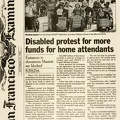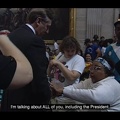TITLE: Clinton, disability rights advocates reach accord on attendant services
by Gary Bosworth, special to Access USA News
Photo (possibly by Gary Bosworth): A line of ADAPT protesters, mostly in wheelchairs are chanting on the sidewalk outside a large stone building. Quinn Brisben and Ken Heard are at one end and Bob Kafka at the other. You can see barricades behind them. Caption reads: Members of ADAPT protest in front of the Marriot in San Francisco during the annual convention of the nursing home lobby, American Health Care Association.
[This article continues on ADAPT 754 but the entire text is included here for easier reading. There is a statement by Gov. Clinton after this article.]
On Monday, October 19, the Clinton/Gore campaign released a policy statement that forcefully supports attendant services for persons with disabilities instead of institutionalization
The agreement worked out was the culmination of more than a month's negotiation between the Clinton/Gore campaign and the disability rights group ADAPT. In September, ADAPT contacted both the Bush/Quayle and the Clinton/Gore campaigns about the issue of attendant services.
Both campaigns were asked to issue policy statements supporting independence for persons with disabilities through attendant services. A mid-October deadline for the statement was given because ADAPT was going to be In San Francisco for a national action at the site of the annual convention for the nursing home lobby, American Health Care Association (AHCA).
While the Bush/Quayle campaign ignored the request, Clinton/Gore worked on a statement that was faxed to ADAPT as they were arriving in San Francisco on October 17. The Clinton/Gore statement went a long way to addressing the needs of attendant services, but was still missing the fact that a major crux of the problem had to with the bias in how federal regulations favor more expensive nursing home care instead of less expensive, more efficient attendant services
Without the additional language, ADAPT went ahead with its planned non-violent protest march on Monday, October 19. Over 400 persons with disabilities marched in two `groups`, targeting the headquarters of Bush/Quayle and Clinton/Gore simultaneously.
In response, the Bush/Quayle headquarters not only blocked off all wheelchair access to their headquarters, they also installed barricades blockading the entrances outside manned by platoons of police, Over at the Clinton/Gore headquarters no barricades were erected as more than 100 persons in wheelchairs from twenty states occupied every nook and cranny of the headquarters, leaving several dozen protesters lined up outside as police looked on without barricades
After several hours of the occupation, an updated version of the earlier statement was faxed directly to ADAPT at the protest, from the Clinton/Gore national headquarters. The new revised statement was read to the assembled crowd of wheelchair warriors by Clinton’s director on national disability policy, Bobby Simpson.
The final proposal is a far-ranging progressive document that: (1) persons with disabilities must be given the right to choose consumer-driven, community-based attendant services versus institutionalization, (2) employment as attendants by young women and men will be encouraged as an option under the National Service Trust Fund service to their community, (3) appointing a task force that will submit a reform package within the first 100 days of the Clinton Administration to overhaul federal regulations to remove their overwhelming institutionalization bias and instead propose regulations to make attendant services more available, and (4) the task force will include members with disabilities from prominent disability rights `groups` such as ADAPT.
With this victory, the occupation was called a success by both the peaceful protesters in their wheelchairs and the workers of the Clinton/Gore campaign. That was in sharp contrast to the mood at the Bush/Quayle headquarters where the republican campaign refused to negotiate and instead issued a statement that the efforts by ADAPT were 'counter-productive' and 'a disservice to the disabled'.
The next day, the mood changed again when California’s budget cuts in the state SSI/SSP of 16 1/2percent and attendant services of 12 percent were the subject of the action. The two sites targeted were the federal building and the state building in San Francisco.
The police were caught off guard being stationed only at the state building. The federal protective service in charge of the federal building wasn't ready either. What followed was a declaration by ADAPT that the federal building was being turned into a nursing home for the day with all access in and out shut down.
Police responded with mass arrests of 49 protesters in the plaza in front of the federal building as the protesters linked arms and wheelchairs together. The remainder of the group then continued on to the state building. Police had removed troops from the state building to go to the federal building. No arrests occurred at the state building as the group chanted and passed out fliers to passers-by.
The 49 arrested were held for the day, ticketed, and released down at pier 38, which the police turned into a huge booking and holding facility.
On the final planned day of protests, Wednesday, the AMCA convention hotel was the site of the dally protest. Police arrested 114 persons that day when the driveways and streets in front of the Marriott hotel were blocked by people using wheelchairs. It took hours to transport those arrested back down the pier. This prompted Mike Auberger of ADAPT to comment, "If I knew I would be spending so much time here I would have brought my fishing pole.”
When released, the group marched in formation backto their own hotel for a night of celebration. It was a long week of work done getting the message out to the general public about the issue of attendant services as a basic civil rights issue.
Among the celebrations held Wednesday night was a special wedding ceremony of two ADAPT protesters from Philadelphia and a musical concert put on by performers with disabilities that lasted into the wee hours.
By all accounts, the week was a success. Even the police mentioned several times they were totally unprepared for the dedication and training of ADAPT members during the action to the point of admiration that the protesters never lost sight of why they were there - to expose the inhumanity of locking up persons with disabilities into nursing homes, when attendant services are less expensive, more humane, and let individuals retain their civil rights.
the end
TITLE: Statement of Governor Clinton on Personal Assistance Services
I support efforts to make affordable personal assistance services available to Americans with disabilities. We must ensure that all people have the opportunity to live independent lives. People who have disabilities and have a need for personal assistance services should have maximum control over the care they receive. Personal assistance serves must be consumer driven- they must be met by the needs and desires of the user, not the dictates of the supplier.
I believe that personal assistance services are of the utmost importance. I understand that every person has different needs. For this reason, I believe that every person has the right to personal assistance services.
I believe that personal assistance services should be provided by a wide range of
qualified individuals. In my proposal for a National Service Trust Fund, I have suggested
that young men and women who go to college can pay for their education by spending
two years working in jobs which serve our community - teaching our children, policing
our streets, rebuilding our infrastructure. Employment in personal assistance services
should be an option in this program, and I hope thousands of men and women choose it.
This is only one of many ways in which we can expand the scope of available services.
Personal assistance services should be a part of any comprehensive health care
reform plan. For this reason, I intend to appoint a task force, including individuals with
disabilities, on the role of personal assistance services and long term care in health care
reform. Among other things, this task force should examine the role of federal regulations
and funding which creates a presumption in favor of institutionalized care over home and
community-based services. I have promised to submit a reform package to Congress in
the first 100 days of my Administration. The task force will submit recommendations on
reform in that time period.
It is time for America to realize that silence on issues of concern to people with
disabilities is as damaging as prejudice. As President, I will work with individuals with
disabilities to empower people to live independently, I will bring people together and
make this plan a reality.
- Author
- Gary Bosworth, Special to Access USA News
- Created on
- Tuesday 16 July 2013
- Posted on
- Tuesday 10 September 2019
- Tags
- ADAPT - American Disabled for Attendant Programs Today, AHCA - American Health Care Association, APTA suit, arrests, attendant services, blocking entrances, Bob Kafka, Bobby Simpson, Bush Quayle campaign, campaign headquarters, Clinton Gore Campaign, disservice to the disabled, Erik von Schmetterling, federal building, fliers, Gary Bosworth, institutional bias, Jimmi Schrode, Ken Heard, long term care policy, Marriot Hotel, nursing home for a day, occupation, philosophy, Pier 38, Pittsburgh, police barricades, pre-work, President Bill Clinton, President George Bush, Quinn Brisben, State Building, weddings
- Albums
- Visits
- 950
- Rating score
- no rate
- Rate this photo


0 comments